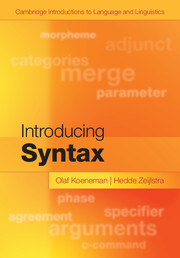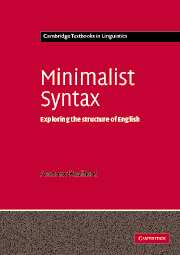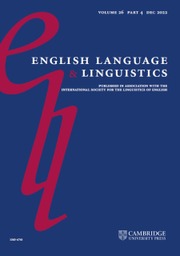Introducing Syntax
Syntax is the system of rules that we subconsciously follow when we build sentences. Whereas the grammar of English (or other languages) might look like a rather chaotic set of arbitrary patterns, linguistic science has revealed that these patterns can actually be understood as the result of a small number of grammatical principles. This lively introductory textbook is designed for undergraduate students in linguistics, English and modern languages with relatively little background in the subject, offering the necessary tools for the analysis of phrases and sentences while at the same time introducing state-of-the-art syntactic theory in an accessible and engaging way. Guiding students through a variety of intriguing puzzles, striking facts and novel ideas, Introducing Syntax presents contemporary insights into syntactic theory in one clear and coherent narrative, avoiding unnecessary detail and enabling readers to understand the rationale behind technicalities. Aids to learning include highlighted key terms, suggestions for further reading and numerous exercises, placing syntax in a broader grammatical perspective.
- Presents the major insights behind syntactic theory in one clear and coherent narrative, avoiding unnecessary technical detail
- Suitable for readers from linguistics, literature and English language backgrounds
- Pays attention to most canonical phenomena and constructions of English syntax, fitting them into the overall narrative
- Features highlighted key terms, chapter introductions and summaries, further reading suggestions, plus numerous exercises
Reviews & endorsements
'A lucid, accessible, and deeply informed introduction that leads carefully to substantial understanding of language and linguistics. A very welcome contribution.' Noam Chomsky, Massachusetts Institute of Technology
'This introduction to syntax is a new and interesting teaching tool. The way it is conceived allows the students to get insights into the reasoning mechanisms of formal syntax that go beyond technicalities. The approach is sound and solid and also provides useful exercises and activities that help the student to start working with the basic bricks of syntactic theory acquiring at the same time the gist of linguistic analysis.' Cecilia Poletto, Goethe University, Frankfurt and University of Padua, Italy
Product details
March 2017Adobe eBook Reader
9781108184588
0 pages
0kg
This ISBN is for an eBook version which is distributed on our behalf by a third party.
Table of Contents
- Introduction. The language machine
- 1. Categories and features
- 2. Merge
- 3. Theta theory
- 4. Case theory
- 5. Agreement and uninterpretable features
- 6. Movement and remerge
- 7. Unifying movement and agreement
- 8. Syntax and morphology
- 9. Syntax and phonology
- 10. Syntax and semantics
- Afterword
- Glossary
- References
- Index.







